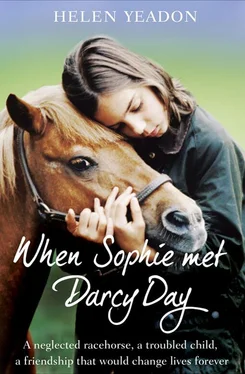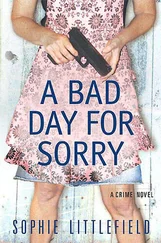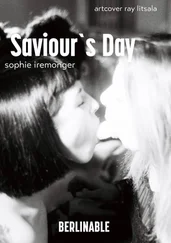As her parents drove off, I swept over and introduced myself. ‘I’m just on the way to change the dressings on a horse called Darcy,’ I told her. ‘Come with me.’ On the way to the barn, I explained about the condition Darcy had arrived in just a few days earlier and what steps we were taking to try to help her. There was no reaction and I began to wonder if Sophie had a hearing as well as a speech problem.
And then the three of us – Michael, Sophie and me – walked into the barn, and Darcy astonished us by going straight over to Sophie and lowering her head to be petted.
‘I brought her a great big breakfast this morning and she never comes over to me,’ I complained, but really I didn’t mind at all. We never ask for anything in return from horses we rescue. That’s not how it works.
I could tell Sophie was pleased. She held out her hands and Darcy put her nose into them. Even though she must still have been feeling rotten with her legs and all her other health complaints, she was able to make a connection with this silent little child.
I laid out the equipment for changing the dressings and as I worked, I asked Sophie to hand me the items I needed. She seemed bright enough, finding the correct bandages or tubes of ointment and holding them out until I was ready to take them, but it felt strange talking to someone who never talked back. Michael and I found ourselves chatting more than we normally would have just to fill the silence.
After I’d finished with Darcy, I led Sophie to the hen house and showed her how to look for eggs, and how to feed the chickens, then she just trailed round helping me with my normal jobs for the next couple of hours until her parents came back. I decided not to introduce her to the rest of the children in the stable, because they wouldn’t have been able to resist asking questions and possibly even making fun of her. It seemed better to keep her busy and out of the way of the others.
When Sophie saw her parents’ car, she walked across to it with the same sullen posture as when she’d arrived, opened the back door and climbed in. She didn’t so much as wave goodbye to us.
‘Thank you very much,’ her mother shouted out of the window as they left.
‘Do you think she’ll be back next week?’ I asked Michael.
‘I don’t know.’
‘She seems very troubled. I wonder what that could be about?’
‘Who knows? Perhaps she’s perfectly capable of speaking and has just decided to rebel, but you’d think the odd word would have slipped out at some stage over the last two years.’ Michael rubbed his chin thoughtfully.
‘I was wondering if she’s had some kind of traumatic experience. Maybe she’s being bullied at school.’
I’d been bullied myself, back at the age of thirteen. We’d left the farm where I’d had such a happy childhood with my horses, and moved to a town. At the new school I was sent to, the other girls found me very unstreetwise. They were interested in boys and dating, while all I cared about was animals. On the first day, one girl ran a finger down my back to see if I was wearing a bra, and they all laughed when they found I wasn’t. They weren’t violent towards me but they treated me as though I were some lowly creature, not worthy of attention, so I’ve always felt sympathetic to any children in the same situation.
During the following week, my thoughts kept returning to Sophie and I wondered whether I should have handled her differently, but I decided that my policy of just treating her as if everything were completely normal was the best one. She didn’t want me bombarding her with questions and I’m sure she’d had enough people coaxing and cajoling her to speak both at home and at school. It seemed most natural to me to pretend everything was fine, that her silence was nothing out of the ordinary.
The following Saturday, I was surprised but pleased when I saw her parents’ car pulling into the yard and watched Sophie climbing out of the back door.
‘Is it all right if she stays another couple of hours with you this morning?’ her mother called.
‘Yes, of course,’ I replied. ‘Sophie, do you want to come and see Darcy? Her legs are much better than they were last week.’
She followed me eagerly, and once again Darcy came over to see her as soon as we entered the barn, making a gentle whickering sound. She definitely recognised Sophie, because she didn’t get up and come over to any of the other children. I told Sophie this and she looked very pleased.
‘Why don’t I teach you how to groom her?’ I suggested. ‘These are the brushes here.’ I showed her how to stand round the back of the horse and start by feeling it all over with your hands, smoothing down in the direction of the hair, watching the horse’s reaction to your touch, before you start work with a brush. I told her that the tummy can be tickly so you’ve got to apply the right amount of pressure, and cautioned her to avoid Darcy’s injured legs.
Sophie started work with enthusiasm, concentrating hard on doing the job to the best of her ability. Darcy was enjoying it so much that her eyelids began to droop and she almost nodded off on her feet. That’s a huge compliment from a horse, implying absolute trust, and it was yet another sign of the growing bond between them.
I took the opportunity to go and have a chat with the other children who were there that day. I explained to them about Sophie not talking and asked them just to treat her normally and not to refer to it. Bless them, they were as good as gold, accepting her as one of the crowd and ignoring the fact that she never joined in their conversations.
At the end of the morning, when the work was finished and the kids were waiting for their parents to pick them up, I usually invited them into the kitchen for a drink. I remember thinking on that second Saturday that Sophie seemed much more animated than before. Her eyes were sparkling, and when I asked if she would like a Coke, she nodded and smiled her thanks at me.
‘She seems happy enough here,’ Michael commented later. ‘I hope it does her some good.’
It felt odd at first that you talked to someone and there was no response, but we soon got used to it and hardly gave it a second thought. Sophie got into a routine of coming every Saturday and as soon as she got out of the car, she’d run to Darcy’s stable to see her. She slipped into the rhythm of the work on the farm, did as she was told, laughed and smiled with the other children, and seemed the same as them – until you stopped and realised that she was just listening rather than joining in their conversations.
Meanwhile, Darcy continued to recover. Her legs healed, her coat improved and she started to take an interest in life. Every Saturday Sophie would groom her until she was gleaming, and when I took her out for a walk around the yard, Sophie would come along, walking proudly by her side. She obviously felt possessive because whenever she could, she would slip into Darcy’s stable and sit on a bank of straw, just watching. Tish would stride around grumpily and I often heard her laughing at him. It was a pretty laugh, and it made me curious to hear her speaking voice.
There were a couple of occasions when I could feel that Sophie wanted to say something to me. Once I dropped Darcy’s bundle of hay on one side of the barn and Sophie made a noise that sounded like mild protest.
‘What is it?’ I asked.
She looked at me for a moment then rose, picked up the hay and moved it to the other side, and I remembered that that was where Darcy seemed to prefer it. It’s hard to remember every single horse’s individual preferences when you are feeding twenty of them every day, but Sophie knew exactly what Darcy liked.
‘I think she wants to talk,’ I told Michael later, ‘but I’m not sure if she can. Maybe there’s a physical problem?’
Читать дальше



![Джулиан Ассанж - Google не то, чем кажется [отрывок из книги «When Google Met WikiLeaks»]](/books/405461/dzhulian-assanzh-google-ne-to-chem-kazhetsya-otryvok-thumb.webp)








